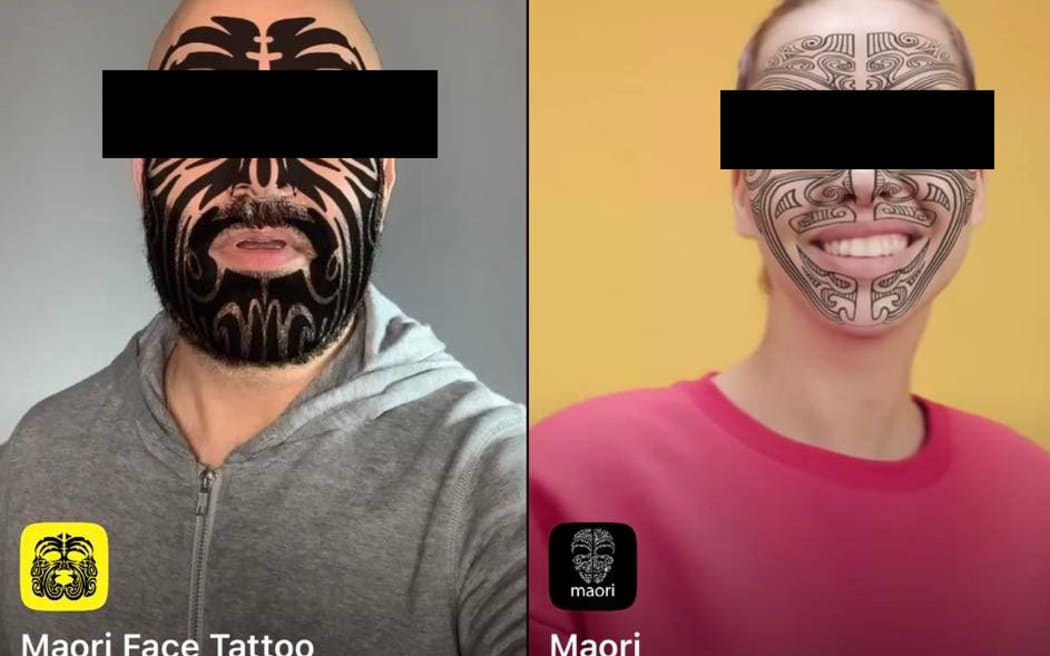
Given names like "Maori Mask" and "Maori Face Tattoo," among others, creators have designed filters that can be used on platforms like Instagram and Snapchat.
To some, easy access to Maori culture has been touted as a positive, a helping lens to the revitalisation of matauranga Maori.
But takatapui Maori activist Mandeno Karu Martin, who has come across several of the filters, said it was also damaging - especially if created from a non-Maori point of view.
"When people wear a fake Prada or Gucci bag, people are quick to call it out. However, when tauiwi create Maori art for profit, everyone thinks it's great.
"There are people who need to take responsibility when they are using Maori culture in an international space or platform to understand that they have consequences and ramifications."
Snapchat filters, which the company call animated lenses, utilise open source Looksery software that allows for the real-time facial modification of photos.
Anyone is able to develop lenses, and they are shared openly across the platform. Instagram filters operate in a similar way.
Ta moko (Maori tattoo) and tatau are unique expressions of whakapapa and identity. They're ancient symbols tied to genealogy, with patterns that vary from hapu to hapu.
Traditional Maori tattoo artist Julie Paama Pengally says ta moko represent more than what the creators could fathom.
"Those elements are strongly connected to our whakapapa, our atua, and our being.
"As soon as you take something from a culture without permission and you misrepresent it, and you displace that culture from doing what they want to do with those things themselves, then you're appropriating."
In this case, anyone - Maori or Pakeha, local or abroad - is able to create and wear a mataora or moko kauae through a single pattern projected through a social media lens.
"That's a mockery of my tīpuna that you're wearing on your face, just so you can have your two seconds of fun.
"For me, it's a long lasting reminder that if I were to have that on my face, people would look at me sideways."
The commercialisation and appropriation of moko has come under increasing scrutiny. Earlier this year, the sequel to the Avatar films came under fire for its depiction of moko on its characters.

Maori musician Turanga Morgan-Edmonds, who plays bass for metal band Alien Weaponry and who got his mataora last year, said he is weary of the commercialisation of moko.
"It's being made by some stranger on the other side of the world to be provided to the masses that don't belong to our culture.
"These ones in the games are blatant rip-offs - they follow the same patterns and all of that.
"Places that take inspiration have taken the concepts, and then designed something completely different."
While the issue of appropriation in Snapchat and Instagram filters may be new, concerns about the mass appropriation of Maori taonga and the lack of protections for it have been raised for years, as well as the lack of urgency taken by the Crown to resolve issues of Maori intellectual property.
In 1991, Maori leaders filed a claim with the Waitangi Tribunal, known as Wai 262.
It called for protection and authority over indigenous species, traditional knowledge, symbols, designs and other cultural property.
"What had been ongoing abuse and misuse of taonga such as the haka, Maori design, and putting Maori faces on tea towels at the time, and so on," one of the lawyers who drafted the claim, the late Moana Jackson, told RNZ in 2011.
"It's a case of protection for the sanctity that's involved in some particular art expressions. A case of saying 'why don't you talk to the people to whom this belongs?'"
It took 20 years for the Tribunal to release a report, Ko Aotearoa Tenei, which recommended the government establish a new commission to protect Maori cultural works from unauthorised commercial use.
It took another eight years for the Crown to respond, and it was only this year that specific funding was set aside to implement recommendations, albeit only a first step.
Mandeno Karu Martin said the Wai 262 process remained a slow burning process, but said that immediate action could take away from the hurt that widespread cultural appropriation, which goes beyond filters, has been inflicted on Maori communities across the motu for decades.
"Our lives are so reliant around immediacy and having to talk about consequences for indigenous cultures.
"Wanting an immediate fix for things like this takes away from the fact that there is mamae, and layers of intergenerational trauma here."
Since being approached by RNZ for comment, Snapchat has since removed the filters from their platform.
The company did not provide a statement, but all lenses are able to be reported for review by the company using in-app reporting tools.
Meta, which owns Instagram, did not respond by deadline.












